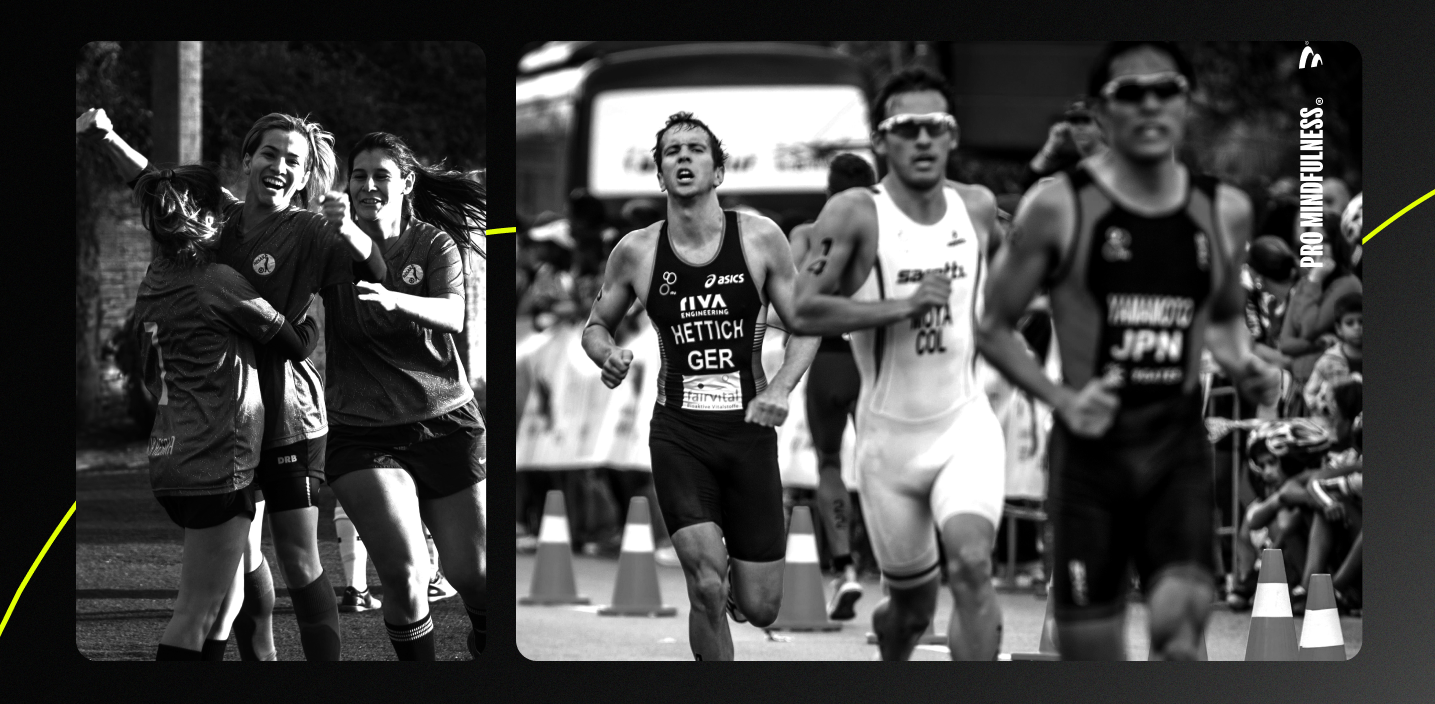
Train your mind,
Transform your game.
Build a habit of mindfulness to achieve peak performance.
TRANSFORM YOUR GAME
TRAIN. YOUR. MIND.
TRANSFORM YOUR APPROACH, TRANSFORM YOUR RESULTS.
→
TRAIN. YOUR. MIND.
TRANSFORM YOUR APPROACH, TRANSFORM YOUR RESULTS.
→

Train Differently
Make the Effort Count
Pro Mindfulness specializes in helping athletes to build a habit of mindfulness, allowing them to access the inner resources necessary to increase focus, cultivate resilience, and achieve peak performance, all while heightening a sense of general well-being. Through programming designed by neuroscientists and Olympic coaches, tailored to individual athletes, we offer evidence-based insights and outcome-based strategies, equipping elite and aspiring athletes with proven methods for managing stress, overcoming self-limiting beliefs, and meeting their full potential.

MINDFULNESS
Mindfulness is the awareness that arises through paying attention, on purpose, in the present moment, without judgment.
Jon Kabat-Zinn

BENEFITS
By cultivating the ability to turn toward their thoughts, emotions, and physical sensations, rather than avoiding them, athletes gain clarity about what is required of them and what resources are available to them, empowering them to navigate any challenges they encounter.
_________________________________________________________________________________________________________________________________________________________________________
Performance
Flow, or being in-the-zone, is a well-researched phenomenon linked to peak performance. To achieve flow, athletes must learn to trust their talent and training in the moment, overcoming overthinking, hesitation, and self-limiting thoughts. Athletes learn to recognize their thoughts and to identify patterns of thought. This allows them to implement strategies to dissolve, challenge, or reframe thoughts as needed to perform at their peak.
Focus
Athletes are coached to hone their attention and learn to recognize anytime the mind wanders, then immediately refocus. Focus of this nature is critical when learning new skills. Athletes also practice open-awareness, keeping more than one object of attention in their focus. This skill is critical in game situations when athletes need to be aware of the ball, passing lanes, defenders, etc.
Habit Formation
Athletes are coached to identify and commit to personal intentions. They gain insight necessary to recognize habitual patterns that no longer serve them well. They are taught strategies for overcoming the brain’s negativity bias and its inclination to avoid anything uncomfortable or unfamiliar. In this way, athletes create a habit of employing healthy coping mechanisms when facing adversity, in addition to leveraging healthy habits to achieve goals.
Stress Reduction
Athletes face physical stress, time stress, and performance stress, often while coping with academic and social stressors, or life transitions, as well. Fortunately, communication between the body and the brain is a two-way street. Athletes learn to direct the mind in a way that eases the body’s stress reaction and direct the body in a way that stills the mind.
Resilience
Resilience is a mindset, which means it can be cultivated and honed. Athletes are trained in practices that interrupt the body’s natural fight or flight reaction, allowing them to remain grounded and calm in high-pressure situations. This empowers athletes to find opportunities for growth in whatever challenges might arise.
Well-Being
By building the mental muscles for mindfulness, athletes increase self-awareness and develop new capacities, strengths, and authentic ways of being. Athletes are then taught to leverage these strengths to manage stress and challenges effectively, both in their sport and in everyday life, without suffering from burnout.

Trainings
-
Eight sessions designed to help you perform at your peak under stress and to access your full potential.
-
Private trainings tailored to address the performance challenges you face. Sessions are scheduled to accommodate your time constraints.
-
Athlete workshops are customized to address the needs identified by the hiring organization. They are experiential and interactive.
-
Workshops for Athletic Departments or Coaching Staffs are customized to address the needs identified by the hiring organization. They are experiential and interactive.

The Origin Story
In the summer of 2021, Ange Bradley, Head Coach of Syracuse Field Hockey, was seeking a solution for a player struggling with her mental health and underperforming on the field as a result. Having exhausted other options (talk therapy, life coaching, sports psychology, and even breath-work) without success, Ange reached out to Kimberly Morrison, a mindfulness expert. Kimberly worked closely with the player, introducing a unique approach rooted in mindfulness. The results were remarkable. The player's demeanor shifted, her confidence increased, and her performance improved.
“The benefits of integrating mindfulness training into athletics became obvious to everyone.”
After witnessing this transformation, her teammates became curious, and soon after, nineteen out of twenty-three players voluntarily joined Kimberly in group sessions. Eventually, the sessions became an integral part of the entire team's weekly routine. The results were outstanding. Players reported not only improvements in their performance but also profound shifts in their overall well-being. In season-end surveys, players self-reported benefits to their health and well-being. The team surpassed expectations, reaching the Elite 8 for the first time in 5 years, and the program experienced 100% player retention.
_________________________________________________________________________________________________________________________________________________________________________
Ange Bradley
Head Field Hockey Coach Syracuse University 2007-2022
"Kim Morrison’s ability to relate to young people & deliver skills to today’s student-athletes helps in all aspects of our athletes’ lives - mental health, general well-being, and performance. I attribute a huge part of our team’s ability to get to the Elite 8 for the first time in 5 years to Kim. As our mindfulness coach, she would meet with the team prior to all competitions & help them find peace, perspective & a relaxed state of mind.”
Eefke van den Nieuwenhof
ACC Player of the Year ‘23
"The sessions led by Kim Morrison have helped me prepare for important field hockey games. Mindfulness helps me to relax and to think about the small things in life that make me a strong person. Thank you, Kim, for all the sessions!”

→ About
Kimberly Morrison
Lucky enough to have spent the best days of her childhood in the Adirondack Mountains (where she continues to hike the high peaks), Kim’s journey to mindfulness began with the transformative experience of growing up surrounded by the sights, sounds, and scents of nature. Formally introduced to meditation over 15 years ago, the practice ignited a strong passion for cultivating resilience and well-being, both for herself and others. Whether through decades of coaching youth sports (including her two daughters who landed in top ten D1 programs), a former career in politics, or being a mother of four children who continues to grieve the loss of a child after years of caregiving, Kim intimately understands the complexities of stress and adversity. Mindfulness presented itself as a profound gift in her life, and she has created an opportunity to introduce others to this healthy and accessible route to resilience. Through her trainings, Kim offers a unique and accessible pathway for athletes to harness the benefits of mindfulness and to thrive in both sport and life.

FAQs
-
Choking, penalties, underperforming in big games or the postseason, and performing better at home than away – these are some of the more obvious indicators that stress is affecting performance. Likewise, if your performance varies greatly (in either direction) from practice to game day, that can also be an indicator.
Some people are better practice players because they aren’t feeling pressured to win, they’re not worried about letting their teammates down, or about who in the stands or on television might be watching. But in a game, these thoughts prevent them from performing at their peak.
Others are better game day players because the love of the game and its intensity allows everything else to fall away. However, their practice suffers because they are more aware of a coach’s scrutiny or are concerned about looking foolish practicing a new skill, or because without the intensity of the game they can’t access focused attention.
Sometimes, the field is our sanctuary, but it is stressful situations outside of our sport – relationships, finances, academics – that interrupt our focus.
Alternatively, you might notice you are often worried about making a mistake, letting your teammates down, or thinking that the coach doesn’t like you or is unfair. Those thoughts will limit your ability to perform at your peak. The good news is mindfulness can help in each and all of these scenarios.
-
Yes! Mindfulness is not magic; it is work. However, research has found that mindfulness increases situational awareness in athletes and first responders, enhances performance for those in high-stress environments—including athletes, students (during test-taking), lawyers, doctors, first responders, musicians, actors, executives, and entrepreneurs—and reduces compassion fatigue in first responders, caregivers, and anyone else who struggles with over-empathizing.
Furthermore, there are 40 years of research indicating that mindfulness can outperform pharmaceuticals in addressing physical, psychological, and behavioral health problems.
Mindfulness is not a replacement for medical or psychological treatments, nor for performance and skill training; it is a necessary complement.
-
Yes! I have read books about field hockey, watched videos and countless games, observed and assisted talented coaches running practice, and over the years learned enough to coach field hockey at a competitive level. But that doesn't make me able to play the sport. Only practicing the sport itself will do that.
Mindfulness takes practice. Not because it is difficult to do, but because it involves breaking old habits and replacing them with new ones. The difficult thing about mindfulness is remembering to do it, and initially to choose to do it over other priorities – especially when so much of our stress is time stress.
At Pro Mindfulness, we approach mindfulness as habit formation, helping clients to set intentions for practice and then to align their behaviors and choices with their goals.
-
Committing to a mindfulness practice can be daunting when our days are already so full. I rarely have a first-time client who does not struggle with this when deciding whether or not to sign up for an 8-week class, or even a single session.
But every one of them has said that the sessions actually created more spaciousness in their lives, either because they became more intentional about how they spent their time and therefore wasted less of it, or because they were more likely to enjoy what was keeping them busy, or both. I hope you’ll experiment and see if this is the case for you, too.
-
Research indicates the average person has about 60,000 thoughts per day. A staggering 80% of those thoughts are negative (thanks to the brain’s evolutionary negativity bias), and 95% of them are the exact same thoughts we had yesterday due to automatic, subconscious patterns in our nervous system.
The good news is communication between the body and the brain is a two-way street. When needed, we can direct the mind in a way that eases the body’s stress response, and we can direct the body in a way that stills the mind. Participants study how their bodies handle stress and from that investigation, learn to cope with stress, pain, and challenges with grace and composure.
Sessions include, but go beyond, breathing exercises, establishing the connection between thoughts and emotions, encouraging participants to recognize patterns of thought in a way that interrupts unconscious patterns of behavior, gaining agency over our own minds, and allowing us to meet our fullest potential.
-
Yes! Pro Mindfulness teaches clients to systematically address physical restlessness and a wandering mind in order to interrupt the body’s physiological reaction to stress, allowing us to choose, skillfully, how we respond to life’s challenges.
Being busy doesn’t mean we have to be overwhelmed. Being fast doesn’t mean we have to be in a hurry. Responsibilities don’t have to feel like obligations. Relationships don’t have to be so complicated. Grief doesn’t have to be all-consuming.
With mindfulness, we can remember what it’s like to sleep well and to feel well—whatever internal or external stressors we may be facing.







